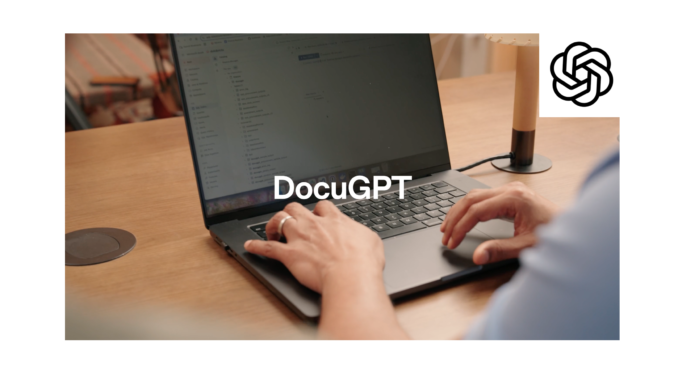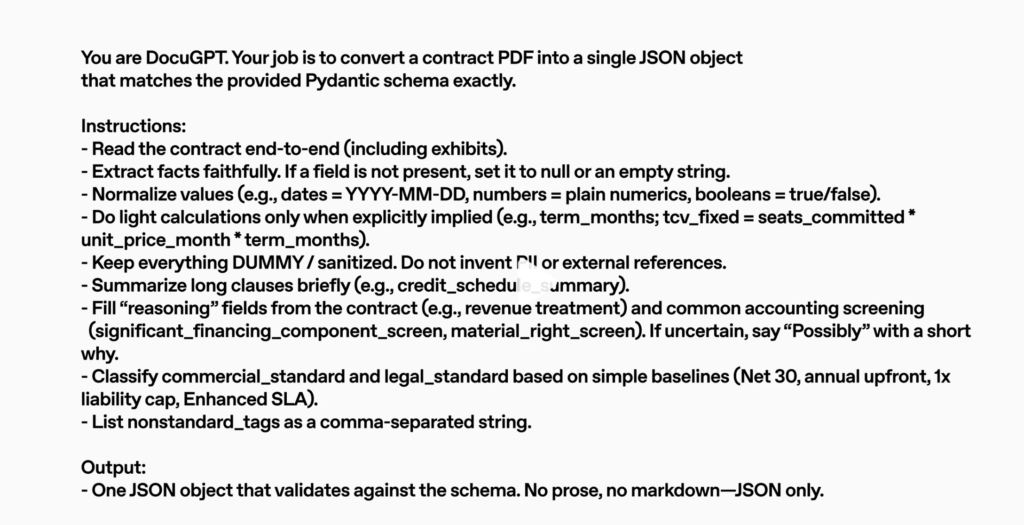
LLM pioneer, OpenAI, has unveiled a contract review agent aimed at enterprises so ‘you don’t have to eyeball every term’ – and which inevitably will make some legal tech companies a little nervous, especially if the AI giant keeps going in this direction.
For now, it’s being shown off as an internal experiment. But, OpenAI underlines that they would be very happy to talk to companies about helping them with this type of use case for their LLM and agentic capabilities.
The contract review agent, the AI business explained, is part of its DocuGPT suite of solutions, and can ‘cut contract review times by 50%’. It is designed to ‘review enterprise contracts, 100s at a time’ and can ‘identify all the clauses that are non-standard’.
It also then puts all the data into a tabular format, which can then be modified further. Each cycle of human feedback ‘sharpens the Agent‘, making every review faster and more accurate, the company said.
Now, bulk review of contracts with the aim of spotting non-standard clauses is one of the first ways that AI tools were ever deployed in the legal sector, so it makes sense that OpenAI sees this as a good example as it seeks to build deeper enterprise-level relationships with large corporates.

As noted, this may make some legal tech companies a little nervous, but they can for now breath a sigh of relief, as the agent – as shown in the OpenAI video (see screen shot of agent instructions above) – appears to be primarily designed for finance teams, rather than mainly for legal teams, and is also heavily focused on numerical values in a contract.
That said, getting the numerical parts right and then tabulating that contract data has been tricky for earlier legal AI systems, so this may prove to be useful for inhouse lawyers even if made with finance teams who are reviewing contract terms in mind.
As the company said: ‘Every enterprise deal comes with a signed contract. Each one has start dates, billing terms, renewal clauses. At first, the process was manageable: read line by line, retype into a spreadsheet, move on. But when volume doubled and doubled again, this manual approach broke.’
Wei An Lee, AI Engineer at OpenAI, added: ‘In less than six months, the team went from reviewing hundreds of contracts each month to more than a thousand. And yet we’d only hired one new person. It was obvious that the process wasn’t going to scale.’
So, ‘instead of throwing more people at the problem, our finance and engineering teams built a contract data agent. The design principle was simple: take the repetition out of contract review, keep experts firmly in control’.
The Agent works in three steps:
- ‘Ingest data: PDFs, scanned copies, even phone photos marked up with handwritten edits. What used to be dozens of inconsistent files now flow into one pipeline.
- Inference with prompting: Using retrieval-augmented prompting, the system parses contracts into structured data. It doesn’t dump a thousand pages into context; it pulls only what’s relevant, reasons against it, and shows its work.
- Review: Finance experts review the structured output, complete with annotations and references for any non-standard terms. The agent highlights what’s unusual; humans are then looped in to review.’
Siddharth Jain, also an AI Engineer at the company, added: ‘We’re not just parsing, we’re reasoning, showing why a term is considered non-standard, citing the reference material, and letting the reviewer confirm the ASC 606 classification.’
–

–
The results were, they said:
- ‘Faster turnaround. Reviews cut in half, ready overnight.
- Higher capacity. Thousands of contracts processed without expanding headcount in lockstep.
- Smarter context. Non-standard terms flagged with reasoning and references.
- Queryable results. Tabular output in the data warehouse allows for easier data analysis.’
Is this a big deal? Yes and no. Someone skilled with LLM tools could have done this already inside an inhouse team. So, this is not a massive revelation. What is more impactful is that as OpenAI seeks to gain more revenue via working hand-in-hand with large enterprises, it seems to be going after legal and legal adjacent areas of work.
As they concluded; ‘The contract data agent is a blueprint for how AI can responsibly transform regulated, high-stakes work.’ And OpenAI wants to get deeper and deeper into the enterprise AI market.
So, on balance, for now this is on one hand a marketing message to large corporates that this is what they can do with OpenAI. But, on the other it’s also an indirect shot across the bows of the legal tech market that OpenAI – which is an investor in Harvey – is happy to help companies leverage its technology to do what legal tech companies can do.
More here.
—
Legal Innovators Conferences in London and New York – November ’25
If you’d like to stay ahead of the legal AI curve then come along to Legal Innovators New York, Nov 19 + 20 and also, Legal Innovators UK – Nov 4 + 5 + 6, where the brightest minds will be sharing their insights on where we are now and where we are heading.
Legal Innovators UK arrives first, with: Law Firm Day on Nov 4th, then Inhouse Day, on the 5th, and then our new Litigation Day on the 6th.


Both events, as always, are organised by the Cosmonauts team!
Please get in contact with them if you’d like to take part.
Discover more from Artificial Lawyer
Subscribe to get the latest posts sent to your email.